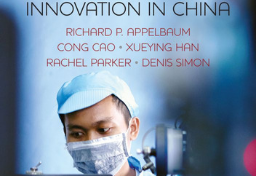Appelbaum, co-principal investigator at UC Santa Barbara’s Center for Nanotechnology in Society, which conducted much of the research for the book over a decade, noted that China’s ambitions are driven by President Xi Jinping. In his 2012 “Chinese Dream” speech, Xi rejected the humiliations of the 19th century and declared that China was seizing its moment as a global power.
As Appelbaum noted, China has made huge strides. Now the No. 2 economy in the world, it has used a slew of five- and 15-year plans in pursuit of “indigenous innovation” to make impressive advances. In nanotechnology, for example, Appelbaum’s team reported that in 2013 China led the world in patent family counts — 27 percent compared to the U.S.’s 16 percent.
Patents, however, aren’t the same as innovative breakthroughs, Appelbaum said. “Many of those patents are non-productive,” he explained. “They are, one interviewer said, ‘asleep in the safe.’ Lots of publications, but they’re not as heavily cited. On the other hand, the trend lines are always improving. China is not asleep at the wheel. They know about these problems. Their numbers are improving.”
Related Link:
News Date:
Monday, November 26, 2018
December 19, 2018 - 9:18am







